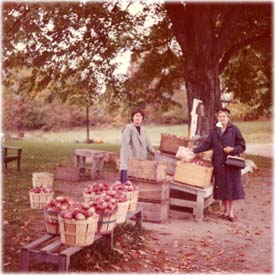Brookdale Fruit Farm was founded in 1847 by Edward Hardy and used primarily for subsistence farming. Summer vegetables and apples were planted around the edges of the fields and along stone walls. The farm owned horses for work and transportation, a few cows, chickens, and hogs. All of the food for the family and the feed for the animals was raised on the farm. The little cash that was earned for the family came from making barrels, or being a cooper.
The next generation changed the direction of the farm by increasing the number of milk cows and starting a delivery route to Nashua. The milk was taken in large jugs by horse and wagon to Nashua where customers put the milk into their own containers and took it home. The major fields were used for grain for the animals, and some of the wheat was prepared for home bread baking.
Each generation made changes to the farm. Harold Hardy, who some of you may remember, left his mark on the farm and the town. After he graduated from the University of New Hampshire in 1910, he planted the rows of trees to begin the orchards as we know them today. He kept the cows and started selling the milk to a dairy in Nashua, as pasteurization had been developed. He also built a storage cellar for the apples and built a packing room, where the farm office is currently located. Later in the early 1940’s, he put in the first cold storage room on the farm. He also started selling produce to individuals, especially on the weekends when families were out for a ride. He also raised peaches, pears, cherries, strawberries, and vegetables. The labor department had not yet regulated farm workers, so children picked the summer produce. It was during this time that the farm stopped raising grain for it’s animals. The railroad began transporting grain into the area, which was less expensive than using the land to raise it.
 |
| Brookdale's first farm stand - set up in the 1960's |
The present older generation that is on the farm have sold all of the animals, including the work horses and cows. With the animals gone they could use the pasture land for raising vegetables and planting more apple trees. Additional land was purchased to increase the acreage that could be cultivated. In the 1960’s, the first Controlled Atmosphere (CA) cold storages were built. The introduction of the 1960’s also saw the operation change from a partnership to a family held corporation. The farm started selling retail produce out by the road in front of Elwin and Betty Hardy’s house. The sales were later moved into the garage, until the business grew to the point that the present stand was built in 1975. At about this time, the next generation came home from college and became involved in the farm operation. The farm has continued to grow, especially in the number of apple trees. The techniques of raising apple trees has changed dramatically, encouraging farmers to make better use of their land by planting either dwarf or semi-dwarf trees in place of the big standard trees. The smaller trees have resulted in better quality fruit, with less use of spray. They have also greatly reduced the chances of injury during picking.
In 2000 Brookdale was chosen as one of 5 recipients of the Ag-Earth Partnership's Millenium Farm/Ranch Family Award. The Ag-Earth Partnership is a coalition of more than 70 agricultural organizations and agencies. It highlights ongoing stewardship efforts that are helping America's farmers and ranchers contribute to clean water and air, healthy soil, sustainable forestry, improved habitat and open space, and a quality environment for all. Brookdale Fruit Farm has been protected for future generations through the transfer of development rights under the state Land Conservation Investment Program. It was one of the first orchards in New Hampshire to adopt Integrated Pest Management strategies to reduce pesticide use and enhance environmental quality.

